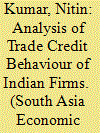| Srl | Item |
| 1 |
ID:
178436


|
|
|
|
|
| Summary/Abstract |
Trade credit transactions are quite common for businesses. The article carries out the trade credit analysis for an emerging economy, namely Indian corporate sector employing rich information dataset covering multiple industries such as manufacturing, services, construction and others, since the period of financial crisis including both firm specific and macro-economic factors. The annual dataset spans 13 years from 2006 to 2018 covering the crisis period. Applying dynamic panel framework, it is found that the inventory management and macro indicators are significant in determining trade credit for Indian firms. While trade payable is chiefly driven by raw material inventory, firms having reasonable stock of raw or finished goods inventory are less likely to offer trade credit. Large-sized firms are found to be both leading consumers and suppliers of the trade credit. The pecking order theory is clearly validated with net profits being preferred over the trade credit that is a more expensive source of finance. Credit from formal financial sources is found to act as a substitute to trade credit borrowing.
|
|
|
|
|
|
|
|
|
|
|
|
|
|
|
|
| 2 |
ID:
161488


|
|
|
|
|
| Summary/Abstract |
The study examines factors influencing non-performing loans (NPLs) for Indian banks. The analysis contributes by including restructured advances also in addition to standard measures of asset quality that provides comprehensive picture of pressure on banks’ balance sheet. Moreover, Bayesian technique with multivariate t-distributed prior is applied for robust estimation. Utilizing quarterly dataset from 2005 to 2015, strong persistence of bad assets is clearly evident. Bank-specific characteristics such as growth of advances, profitability and net interest margin are significant determinants. Among macro-factors, high growth rate is having retarding impact on bad assets. Moreover, ownership effect is having differential behaviour with state-owned banks being most vulnerable.
|
|
|
|
|
|
|
|
|
|
|
|
|
|
|
|